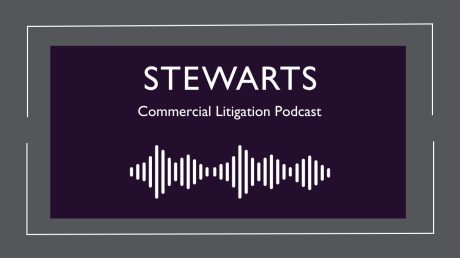The Quincecare duty was established in a claim brought by Barclays Bank against Quincecare after a director of Quincecare drew down a loan and misappropriated the funds.
Quincecare replied with a defence that Barclays was under a duty (which it had breached) to refrain from paying out the loan monies when evidence of fraud was available to the bank. Mr Justice Steyn held that such a duty did exist and applied to banks processing payment instructions when sufficient evidence of fraud was available to them (though this did not apply in the Quincecare case itself).
In the latest episode of the Stewarts Commercial Litigation Podcast, legal directors and podcast hosts Karen Hutchinson and Francesca Berry welcome Head of Insolvency and Asset Recovery Alex Jay to discuss the Quincecare duty.
Listen now on Spotify, Apple, Amazon/Audible and Deezer.
What is the Quincecare duty and when does it apply?
A Quincecare claim typically arises where a customer holds a bank account, the bank receives a payment instruction and when the money is paid it transpires a fraud has taken place and the customer’s money is lost. In order to bring a Quincecare claim the claimant needs to establish that there was evidence available to the bank which would give a reasonable and honest banker reasonable grounds (but not necessarily proof) that the payment instruction may be an attempt to misappropriate the customer’s funds.
Questions answered in this podcast include:
- Where does the line lie between where a bank should follow a client’s instructions and step in to prevent a transaction?
- What does this mean for banks and what factors should they focus on?
- How far does the bank’s positive duty (established in JP Morgan v Bank of Nigeria) to investigates suspicions of fraud extend?
- What is the illegality defence and when can it be used by a bank?
- What about contributory negligence? Why should the onus be on a bank to detect fraudulent activity which the customer has failed to notice?
- What are the implications of the Philipp v Barclays judgment, and are concerns about the ruling valid?
- What can banks do to protect themselves against Quincecare claims?
- Is there a risk of claims being brought against banks for breach of duty to make payment where the customer suffers a loss as a result?
- Does the Quincecare duty only apply to traditional bank accounts, or will it also extend to others, for example handlers of cryptocurrency?
The Stewarts Commercial Litigation Podcast
Every episode of the Stewarts Commercial Litigation Podcast will be available on our website and social media channels, as well as Spotify, Apple, Amazon/Audible and Deezer.
These podcasts will offer guidance and updates both for litigation practitioners and for individuals and companies looking to avoid and manage litigation proceedings. In each upcoming episode, co-hosts Francesca Berry and Karen Hutchinson will speak to subject experts within the Stewarts team.
Each podcast will address the latest issues and legal changes within the topic in question, considering both the most likely routes for a claimant to bring a dispute and what steps a potential defendant could take to avoid costly litigation.
You can find further information regarding our expertise, experience and team on our Commercial Litigation pages.
If you require assistance from our team, please contact us.
Subscribe – In order to receive our news straight to your inbox, subscribe here. Our newsletters are sent no more than once a month.







